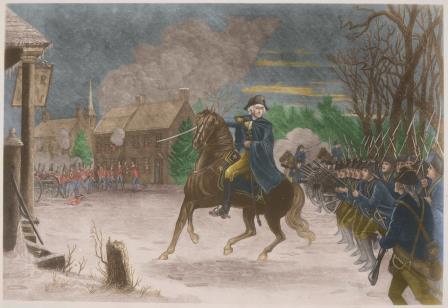Below is a picture depicting George Washington in the Battle of Trenton. George Washington’s horse was wounded during the battle.1 The Battle of Trenton marked a significant victory for the American Army. They carried that momentum into another victory a few days later at the Battle of Princeton. Below is an account of God’s Divine protection of Washington.

Historical Account
The heroism of Washington on the field of Princeton is matter of history. We have often enjoyed a touching reminiscence of that ever-memorable event from the late Colonel Fitzgerald. Who was aid to the chief, and who never related the story of his general’s danger and almost miraculous preservation, without adding to his tale the homage of a tear
The aid-de-camp had been ordered to bring up the troops from the rear of the column, when the band under General Mercer became engaged. Upon returning to the spot where he had left the commander-in-chief, he was no longer there. And, upon looking around, the aid discovered him endeavoring to rally the line which had been thrown into disorder by a rapid on-set of the foe.
Washington, after several ineffectual efforts to restore the fortunes of the fight, is seen to rein up his horse, with his head to the enemy, and in that position to become immovable. It was a last appeal to his soldiers, and seemed to say, Will you give up your general to the foe? Such an appeal was not made in vain. The discomfitted Americans rally on the instant, and form into line. The enemy halt, and dress their line.
The American chief is between the adverse posts, as though he had been placed there, a target for both. The arms of both lines are levelled. Can escape from death be possible? Fitzgerald, horror-struck at the danger of his beloved commander, dropped the reins upon his horse’s neck, and drew his hat over his face, that he might not see him die. A roar of musketry succeeds, and then a shout. It is the shout of victory.
The aid-de-camp ventures to raise his eyes, and 0, glorious sight! The enemy are broken and flying, while dimly amidst the glimpses of the smoke is seen the chief. “Alive, unharmed, and without a wound,” waving his hat, and cheering his comrades to the pursuit.
Colonel Fitzgerald, celebrated as one of the finest horsemen in the American army, now dashed his rowels in his charger’s flanks, and, heedless of the dead and dying in his way, flew to the side of his chief, exclaiming, “Thank God! your excellency is safe!” The favorite aid, a gallant and warm-hearted son of Erin, a man of thews and sinews, and “albeit unused to the melting mood,” now gave loose rein to his feelings, and wept like a child, for joy.
Washington, ever calm amid scenes of the greatest excitement, affectionately grasped the hand of his aid and friend, and then ordered—”Away, my dear colonel, and bring up the troops—the day is our own!”2
Endnotes
1 Bulletin of Information for Cavalry Officers (Washington: October 1920), 510.
2 George Washington Parke Custis, Recollections and Private Memoirs of Washington, by His Adopted Son (New York: Derby & Jackson, 1860), 190-192.
Still looking for answers? Visit our FAQ page
More Resources
Know the Truth and Protect Your Freedoms.
Still looking for answers? Visit our FAQ page
Stay Informed with the Latest Resources
Enter your email address to receive our regular newsletter, with important information and updates right in your inbox!










